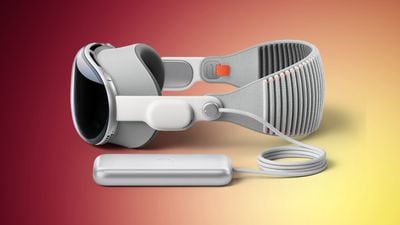Apple’s Vision Pro headset can now be controlled using only thoughts, thanks to integration with neurotechnology startup Synchron‘s brain-computer interface (BCI).
The company today announced that Apple Vision Pro has been successfully used by a patient through direct brain control facilitated by Synchron’s brain-computer interface technology. Mark, a 64-year-old man suffering from amyotrophic lateral sclerosis (ALS), demonstrated the integration.
With this technology, Mark controlled the cursor on the Vision Pro to play Solitaire, watch Apple TV, and send text messages without using his hands, which he can no longer move due to his condition. The Vision Pro’s reliance on hand gestures would otherwise pose a barrier for users like Mark who have lost upper limb functionality.
Mark has been practicing different skills and functions with his BCI twice a week since his implantation in August 2023. He noted that using the BCI to control the Vision Pro is similar to using it for his iPhone, iPad, and computer. Apple’s suite of accessibility features across its platforms has been recognized for its excellence, which is why Synchron initially focused on integrating its BCI with Apple devices.
Synchron’s brain-computer interface allows individuals with severe physical limitations to control digital devices with their thoughts. The BCI is implanted in the blood vessel on the surface of the motor cortex via a minimally invasive endovascular procedure. The device detects motor intent from the brain and wirelessly transmits these signals to external devices, enabling hands-free control. Tom Oxley, CEO and Founder of Synchron, said:
BCI is a platform to re-connect people with injury or disease back to the fast-moving consumer technology landscape. Vision Pro is a powerful system, but it relies on the use of hand gestures to exert control over the UI. We are sending control signals directly from the brain to replace the need for hand gestures. We are moving towards a new Bluetooth standard for Human Computer Interactions that do not require touch or speech. This is a critical unmet need for millions of people with paralysis.
Synchron is preparing for larger-scale clinical studies to expand the reach of its BCI technology. It has implanted its BCI in six patients in the United States and four in Australia. The company continues to seek approval from the U.S. Food and Drug Administration to commercialize its technology.
Popular Stories
iPhone 16 Series Is Less Than Two Months Away: Everything We Know
Apple typically releases its new iPhone series around mid-September, which means we are about two months out from the launch of the iPhone 16. Like the iPhone 15 series, this year’s lineup is expected to stick with four models – iPhone 16, iPhone 16 Plus, iPhone 16 Pro, and iPhone 16 Pro Max – although there are plenty of design differences and new features to take into account. To bring …
Apple Intelligence Now Available in New iOS 18.1, iPadOS 18.1, and macOS Sequoia Developer Betas
Apple is today providing developers with the first betas of iOS 18.1, iPadOS 18.1, and macOS Sequoia 15.1, with the new software introducing an early version of the Apple Intelligence features. These new betas will be in testing alongside the current iOS 18, iPadOS 18, and macOS Sequoia 15 betas. Developers can choose whether to opt into the new betas with Apple Intelligence, or stay on the …
Report: Apple Intelligence Delayed to iOS 18.1 in October
Apple Intelligence will miss its initial expected launch date to give Apple more time to fix bugs, Bloomberg’s Mark Gurman reports. According to individuals with knowledge about Apple’s plans, the company now plans to start rolling out Apple Intelligence in software updates by October, arriving several weeks after the launch of iOS 18, iPadOS 18, and macOS Sequoia. This means that Apple…
T-Mobile Sued for Breaking Lifetime Price Guarantees
T-Mobile customers have filed a lawsuit [PDF] against the carrier, alleging that it failed to honor a guarantee not to raise the prices of select cellular plans. The lawsuit, first spotted by Wired, claims that back in 2017, T-Mobile advertised several of its plans with a price lock, but then went on to increase prices starting in May 2024. “T-Mobile ONE customers keep their price until…




